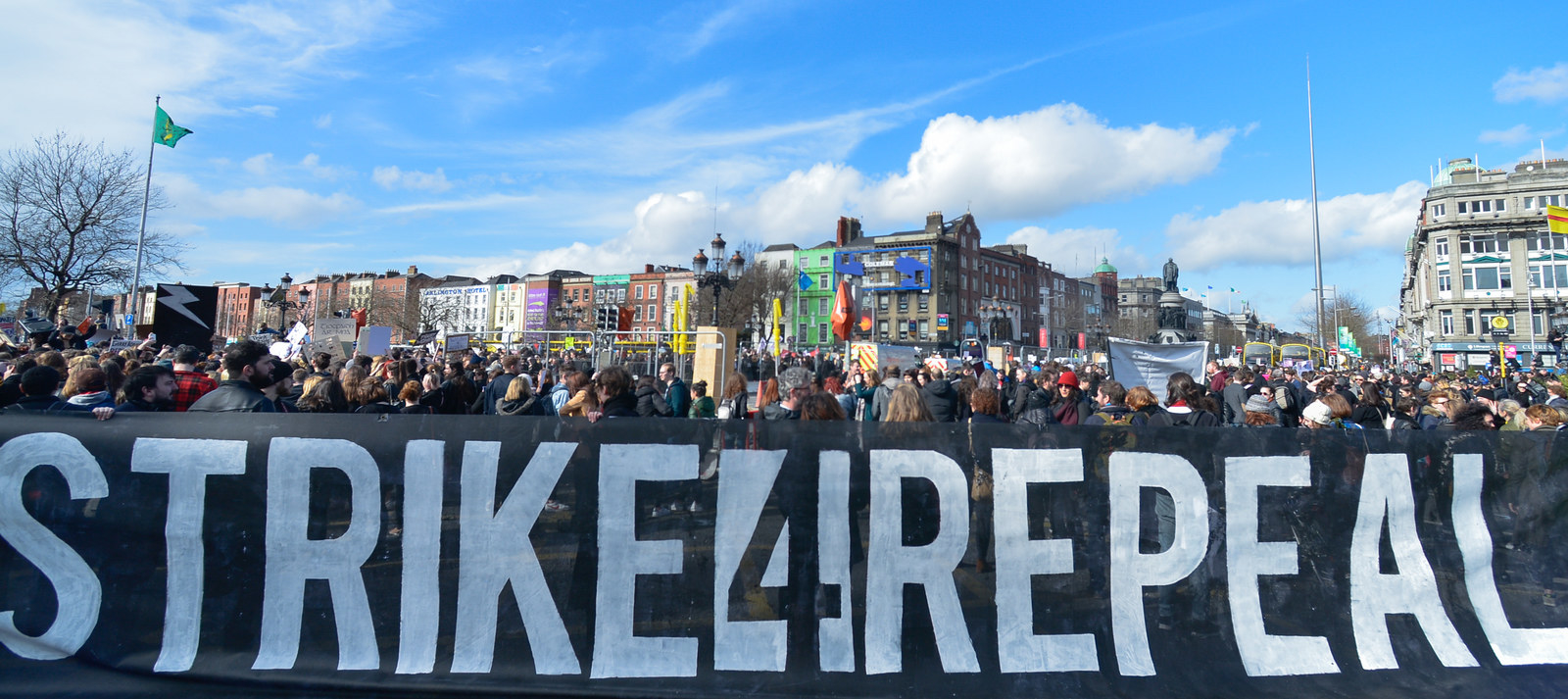“Hands up who’s ever had sex?” Sean Shinners, a man in his sixties from Limerick, shouted across the road to a row of anti-abortion rights protesters.
The group of around twenty protesters – men and women in their sixties and seventies, some wearing cheerfully coloured woolly hats and tasteful floral scarves – stood silently behind banners depicting graphic photographs of aborted foetuses. Looking stony-faced and sombre outside Limerick’s branch of the Bank of Ireland on Tuesday, they refused to engage with the heckler.
“Do you think any of them have even had sex before, let alone impregnated anyone or been pregnant?” Shinners went on, addressing a growing group of passersby who had gathered to see what all the fuss was about.
“Why is it the ones who know nothing about the subject are always so passionate about it?” he continued. “You’re looking at the residual effect of the Catholic Church in Ireland. It’s residue. It’s what’s left at the end of the pot when you’re cooking.”
“Bunch of bastards,” he added under his breath.
The protesters had arrived earlier that day to oppose an abortion rights rally by Rosa (for reproductive rights against oppression, sexism and austerity), who were making a lunchtime stop-off with the “Bus4Repeal.”
Shinners wasn’t invited to speak at the rally; he was merely a passerby who felt incensed enough by the anti-abortion campaigners opposing the group to speak out.
BuzzFeed News joined 48 abortion rights activists and their supporters on the bus, as they spent three days driving around Ireland this week protesting against the country’s highly restrictive abortion laws.
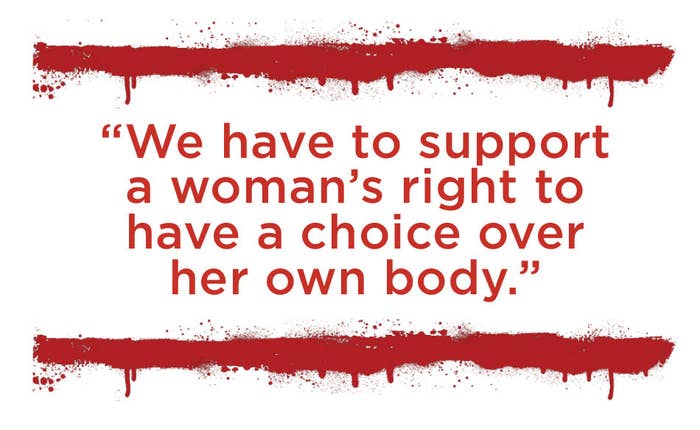
The eighth amendment of the Irish constitution states that abortion is illegal in all circumstances except when a pregnant woman’s life is seen to be in immediate danger. Undergoing or carrying out the procedure is punishable by up to 14 years in prison.
Around 10 representatives of the Irish Centre for Bioethical Reform (ICBR), a recently formed group affiliated with UK-based anti-abortion rights group Abort67, trailed the bus throughout our trip, setting up counterprotests at its stop-offs in Waterford, Cork, Limerick, Galway, Maynooth, and Dublin.
One of them, Christian Hacking, had prompted Shinners’ outburst, by calling out to Limerick locals going about their lunchtime errands for a “dialogue” on “the scientific precedent of whether the unborn is a human being” through his megaphone.
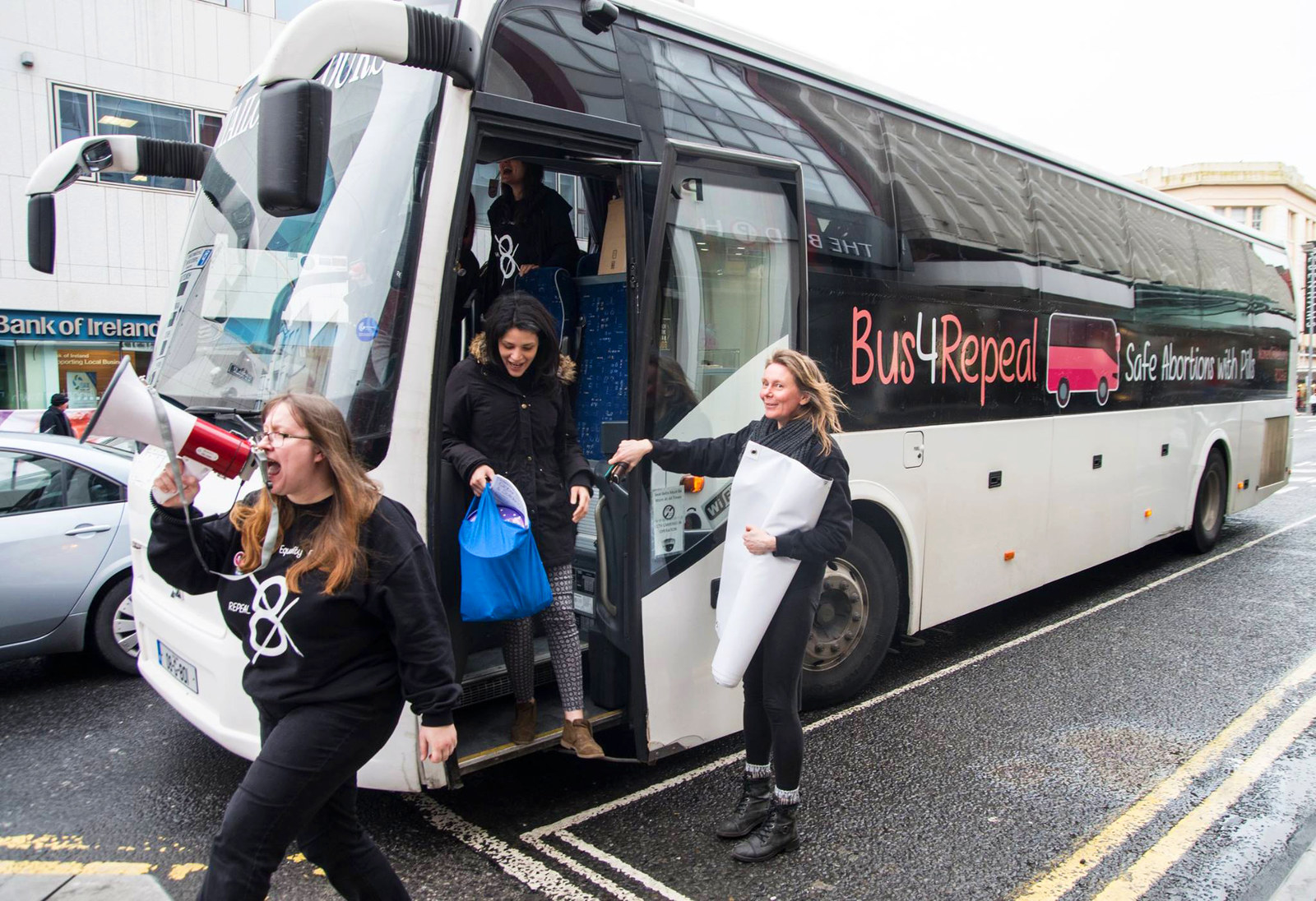
He also turned his attention to four mums at the rally with their babies, assuming that, as parents, they were there in support of the anti-abortion movement. He became visibly irritated when they informed him they were not.
“Just because we’re mothers and pro-motherhood doesn’t mean we’re anti-abortion,” one of the women told BuzzFeed News. “I don’t have a right to tell anyone what they should do with their bodies in the same way that I wouldn’t expect anyone to tell me what’s right for me.”
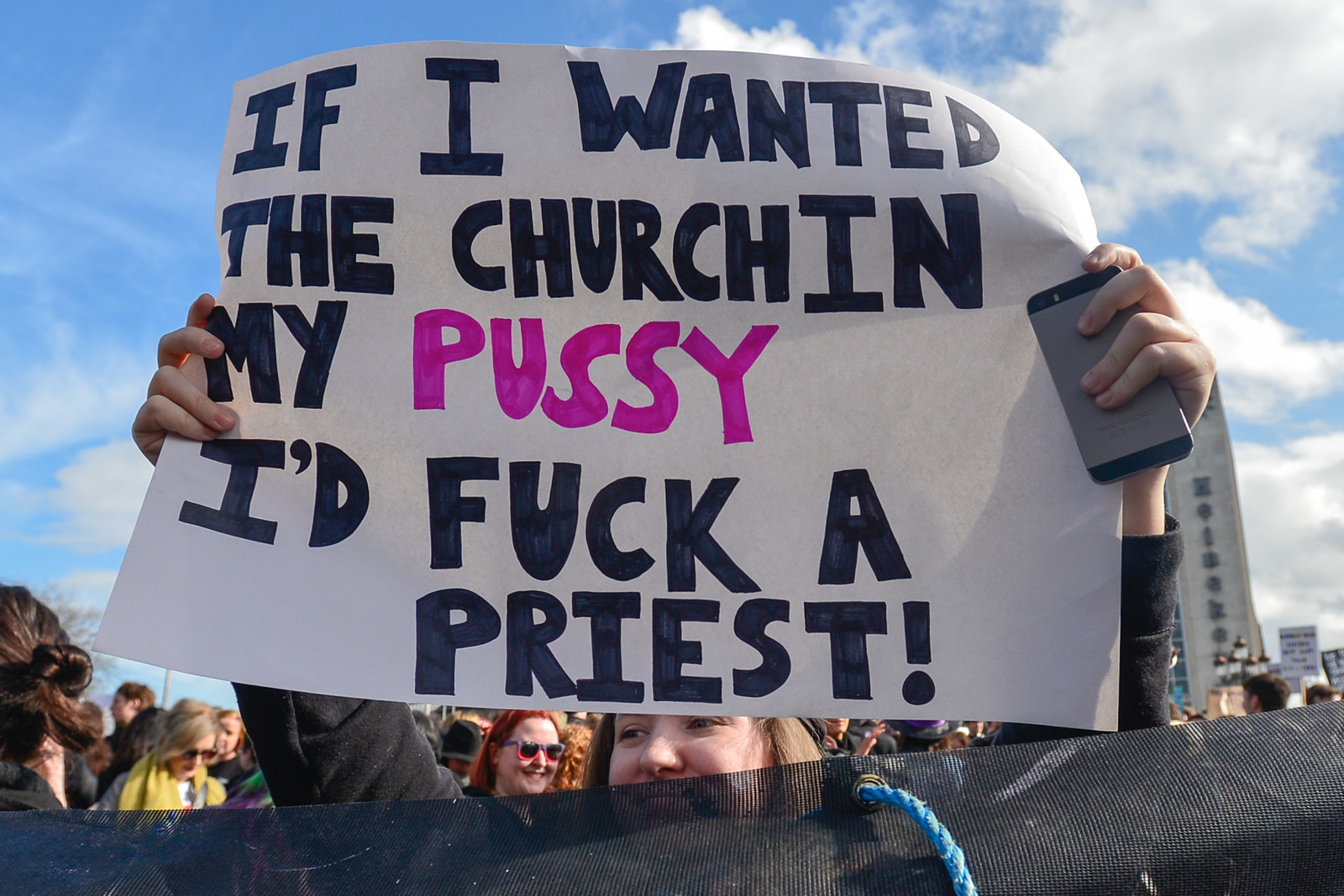
“I am saddened to see mothers of young children in support of ending the life of an unborn child and refusing to engage with the simple scientific argument,” said Hacking in response. “That the unborn child is a human being. It has the exact same DNA as you or me. The only difference between the unborn child and you is time.”
“When have you ever been pregnant?” Shinners hissed, intervening.
He told us he was “absolutely 100%” pro-abortion rights. “I’m pro minding your own bloody business,” he added, and encouraged Hacking and his followers to do the same.
The group on Rosa’s “Bus4Repeal” included men and women, several students, a secondary school teacher, and a representative for Women on Web, a charity that provides safe abortion pills to women in countries where the procedure is illegal. Representatives for local Rosa groups got on and off the bus that sped through the grey and green Irish countryside, to join protests calling for the eighth amendment to be repealed, coinciding with International Women’s Day.
The atmosphere on board was urgent, frustrated, and fired up but also often jovial. Rita Harrold, one of Rosa’s organisers, gave updates on the campaign over the coach stereo, interspersed with blasts of Beyoncé and self-care tips. Chat ranged from sex to studies, and everything was politicised. One student, whose seatmate took an unflattering Snapchat selfie, told her to “repeal your face”.
Despite the large groups cheering on the Bus4Repeal on at each of its stops, smaller numbers of anti-abortion activists were a constant presence. In Galway, local police asked them to take down their banners after receiving numerous complaints from members of the public about the images of foetuses. “We’ll consider making arrests if they continue to refuse to get rid of them,” one officer sighed as he took notes in the freezing rain. He told us that he dealt with this kind of thing quite regularly.
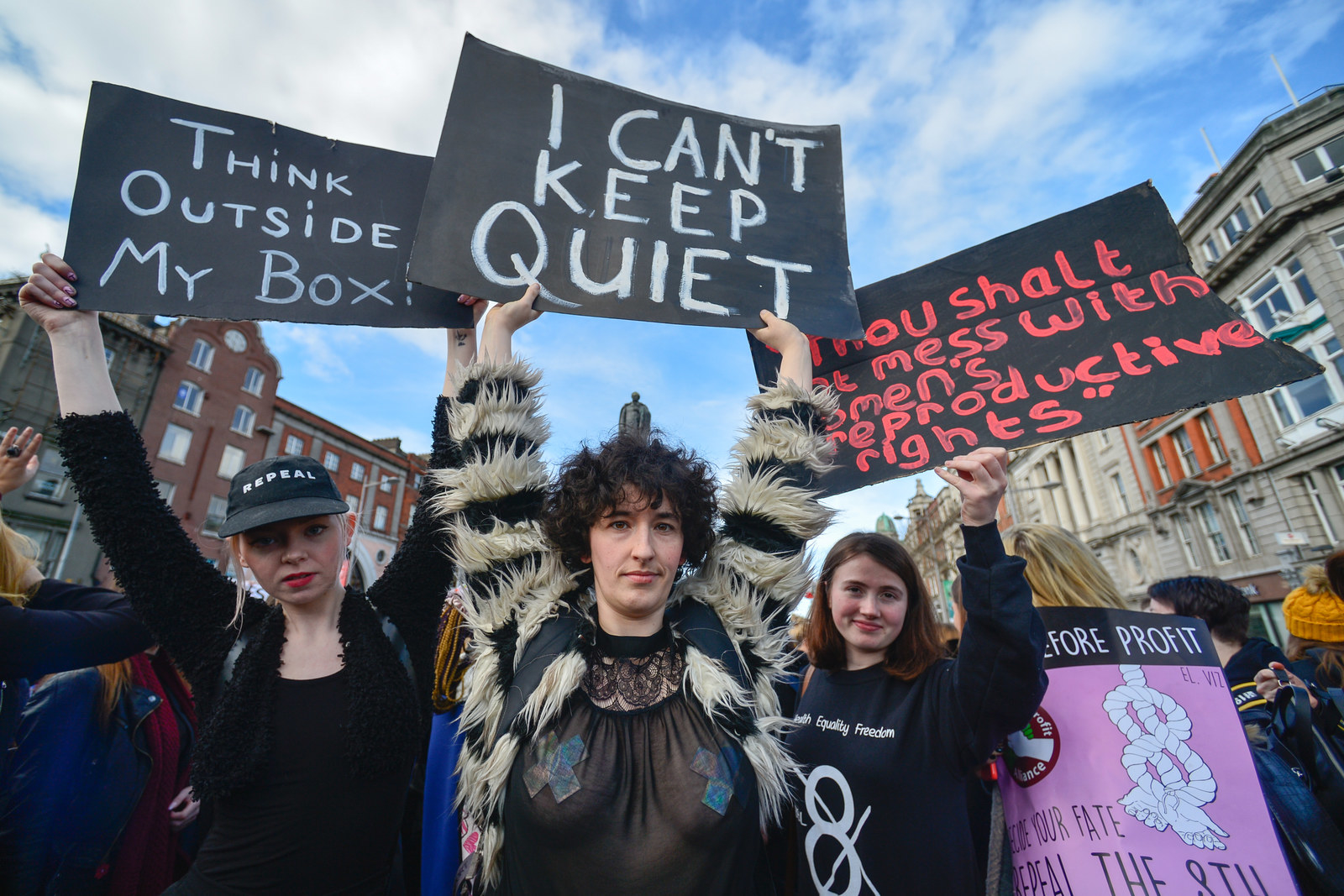
“People find your images offensive and frightening,” another officer told protesters, who had barricaded themselves behind their banners.
"The Germans found pictures of the Holocaust very frightening," one protester snapped back, making a comparison often drawn upon by the anti-abortion rights movement, before the rain got the better of them and they dispersed.
Other than Hacking, the ICBR campaigners seemed unwilling to engage one-on-one when BuzzFeed News approached them, preferring to convey their messages through their megaphones.
Harrold had warned Rosa volunteers to be careful when talking to ICBR activists, all of whom wore body cameras.
Hacking told us they wore the cameras for their own protection and safety. “As you can imagine, people accuse us of all sorts of false allegations, such as harassment of women, following them, hate speech, so we wear cameras so that we have a definitive account,” he said.
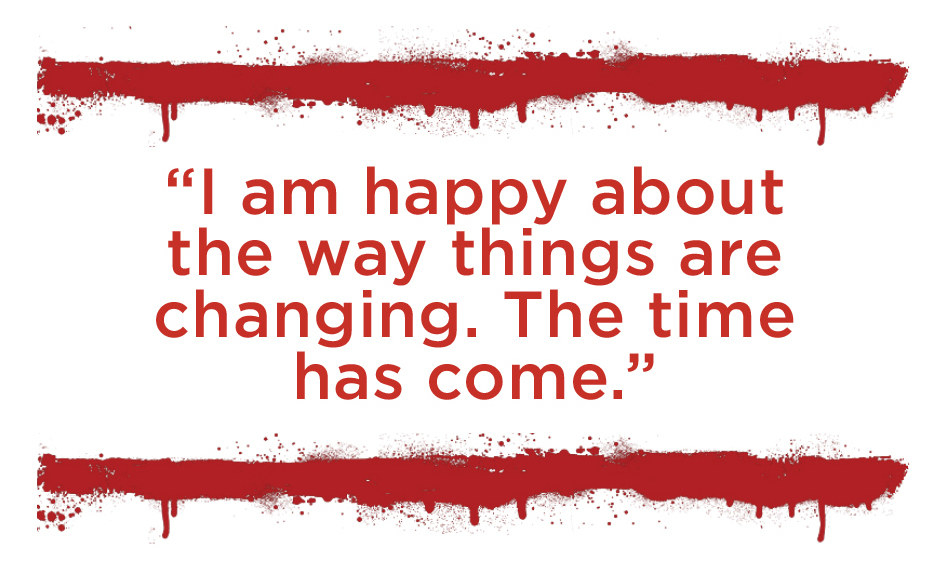
In Cork, where the bus had its biggest turnout of supporters, an elderly woman clutching rosary beads walked up and down a row of around 30 women in witch’s hats, who held signs like riot shields, depicting an 8 crossed through with knitting needles.
She was faced with increasingly urgent chants of “our bodies, our choice” by the witches, a local group of abortion rights activists who came out to create a “protective circle” around the stand where Women on Web shared information about medical abortion and one Rosa volunteer took a call from a woman who was worried she might require their services.
Alongside them, a man shouted his support for Trump’s crackdown on American women’s reproductive rights, and another anti-abortion rights supporter wore a fluorescent vest decorated with cherubic babies, chanting “lies, lies, lies” into his megaphone.
During the Cork rally, Rosa raised over 1,000 Euros selling jumpers baring the slogan “health, equality, freedom” and in cash donations from the public.
Their supportive reception showed how the balance of public opinion seemed to be shifting. “It’s been a long time coming,” one Cork local and a mother of two teenage daughters told us. “When I was a teenager in the ’90s, we had to put up with a lot of this,” she said, gesturing to aborted foetus banners. “But we didn’t have people standing up for choice,” she continued. “I think it’s amazing.”
“I don’t normally like to take a stance on these kinds of things, but it’s really up to an individual person what they do with their body,” a young man, working behind the counter in a newsagents next to the rally, told us.
As the bus pulled up at each new town, Rosa organiser Harrold would pull out her megaphone and chant to get her volunteers riled up ahead of the rally. “Not the church, not the state!” she shouted, receiving a chorus of “women must decide their fate!” in response, before the group stomped off the bus calling: “Get your rosaries off our ovaries!”
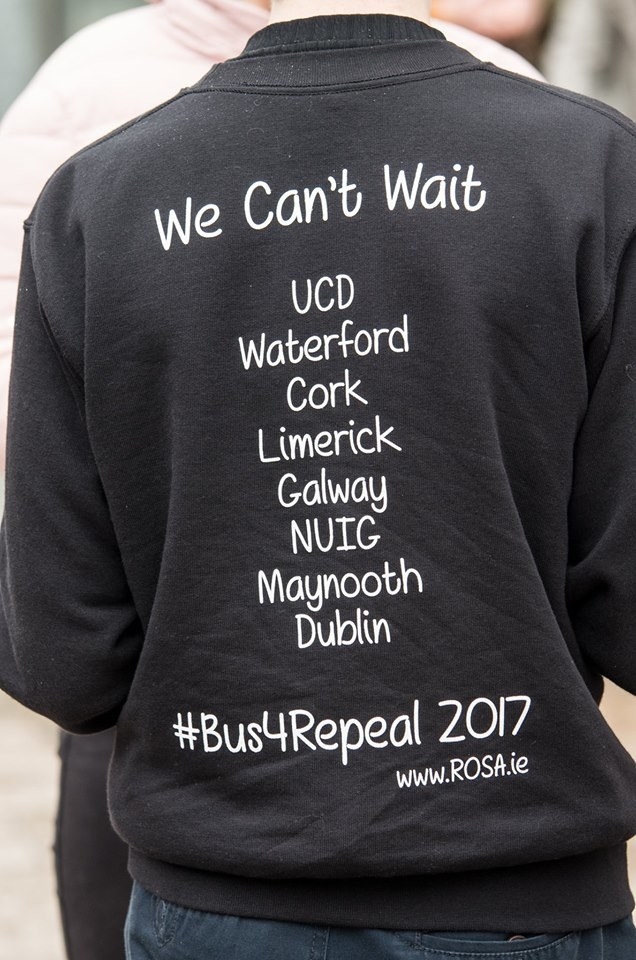
Both slogans, along with numerous other religious wordplays, have become synonymous with campaigns to repeal the eighth. At Dublin’s March4Repeal on Wednesday night, one woman held a protest sign that read: “If I wanted religion in my vagina, I’d fuck a priest.”
The entanglement of church and state never seemed to be far from discussion around abortion both on the bus and on the street.
“I just don’t understand how the pro-lifers can talk about the suffering of unborn babies when we’re making women suffer so much by not allowing them to get an abortion,” one student on the bus said while sweets were passed around on a stretch of motorway between Dublin and Cork. “Yeah, but Catholics think suffering is a virtue,” her seatmate retorted, reaching into a bag of big pink marshmallows. “They want women to suffer.”
Critics’ increasing distrust of the Catholic influence on state affairs was further exacerbated when the remains of more than 700 babies and children under 3 were discovered in a septic tank beneath a former mother and baby home in the town of Tuam, just days before the Bus4Repeal set off on its trip.
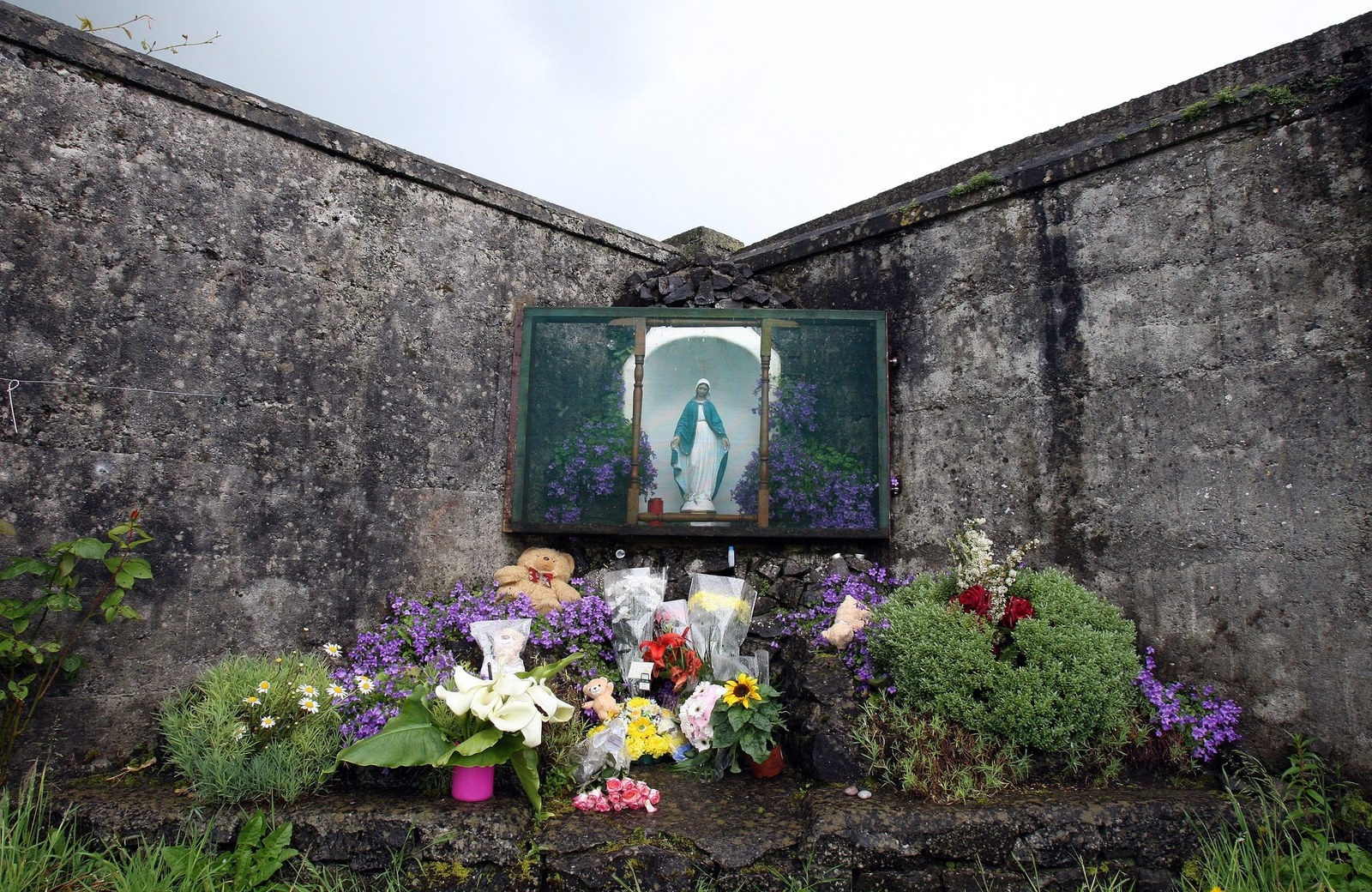
From 1925 to 1961, around 35,000 unmarried pregnant women were sent to the institution run by the Bon Secours order of nuns in county Galway.
Almost everybody we asked about their opinion on abortion around Waterford, Cork, Limerick, and Galway mentioned Tuam. The shocking discovery showed that women and their children faced serious neglect and distress, a reminder of Ireland’s long history of abandoning its “fallen women”. Magdalene Laundries, where women who were thought to have engaged in sexual activity outside marriage were sent, operated from the 18th century until 1996. Mass graves have been discovered where they stood.
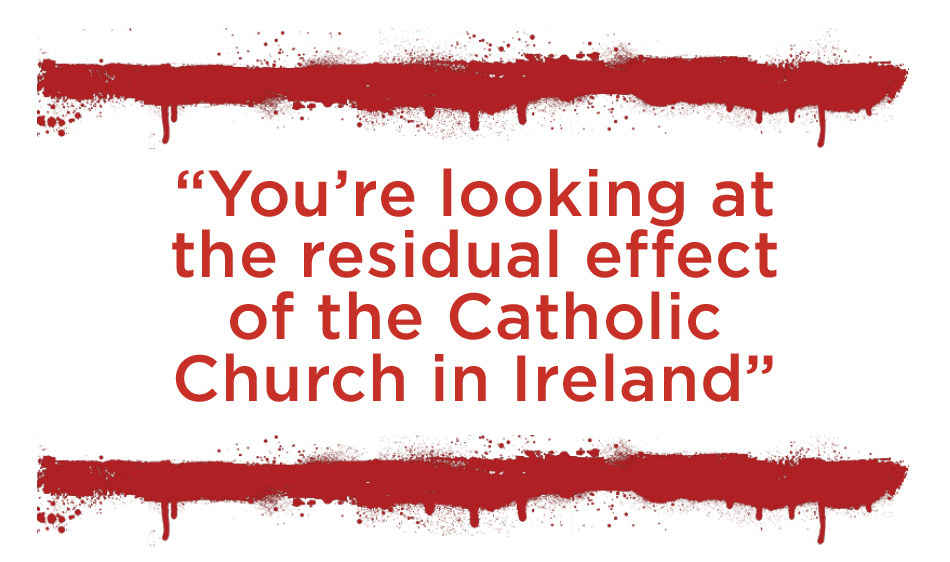
For many, that children, and often their mothers too, were neglected to the point of death when under the care of the church only highlights the hypocrisy of its stated wish to protect the rights of the unborn child by opposing abortion.
“To hear the bishops acting the high moral ground about women’s bodies, women’s lives, and women’s futures is absolutely disgusting,” Ruth Coppinger, the Irish Anti-Austerity Alliance TD [the Irish equivalent of an MP], said during Rosa’s rally in Cork on Monday. “As long as the church and state combine to control and determine the lives of women, their reproductive lives and their futures, we will have the horrors such as we had in the homes.”
“The scandal in Tuam exposes hypocrisy to a huge extent,” a man in Galway told us when asked whether he would support the repealing of the eighth amendment.
One woman in Limerick said it was important that Ireland took the opportunity to learn from the discovery. “We forget very quickly as we move from one scandal like that to the next,” she said. “In a few years that will all be forgotten, but then there will be another Tuam.”
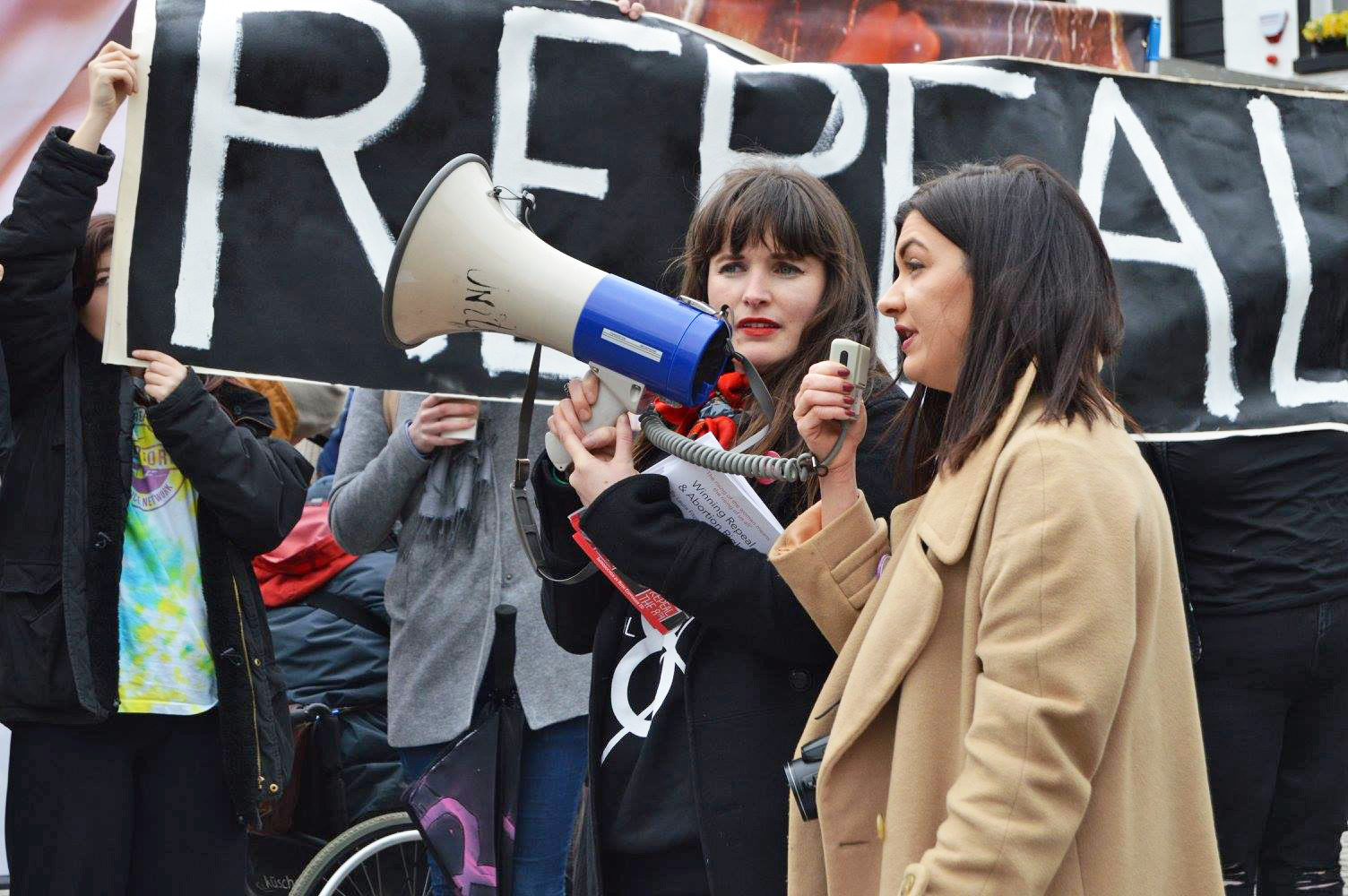
Another, on her way to meet her son for lunch in Limerick, said that even though she didn’t necessarily like the idea of abortion, Tuam proved that preventing it had far worse consequences. “Anything is better than that,” she said.
Ireland’s reputation as one of Europe’s last socially conservative stalwarts, frozen in a time when you wouldn’t admit to doing anything you wouldn’t tell the priest at confession, seems to be thawing. “Twenty-three years ago when I came to Ireland, abortion was a word that people wouldn’t even say,” Stella, a woman in her sixties who was selling “repeal the eighth” badges during the “March4Repeal” in Dublin on Wednesday told us. “I am happy about the way things are changing. The time has come.”
The 2015 referendum on marriage equality, a groundbreaking victory for LGBT rights, represented a massive sea change in progression for the country. Almost everyone BuzzFeed News spoke to during the Bus4Repeal’s tour also cited the Irish government’s recent scrapping of controversial water charges following social-media-led grassroots campaigns as proof that ordinary people could be empowered to shape government policies.
For many, campaigning to legalise abortion is a logical next step for those striving to modernise Ireland. An estimated 12 women per day travel from the country to the UK to access abortion at private clinics, and a further three women per day illegally purchase abortion pills online.
“The Dail [Ireland’s parliament] is a conservative, cowardly institution that does not represent the huge sea change in attitudes there has been on abortion,” Coppinger told the rally at Cork. The crowd, who ranged from students to pensioners, cheered.
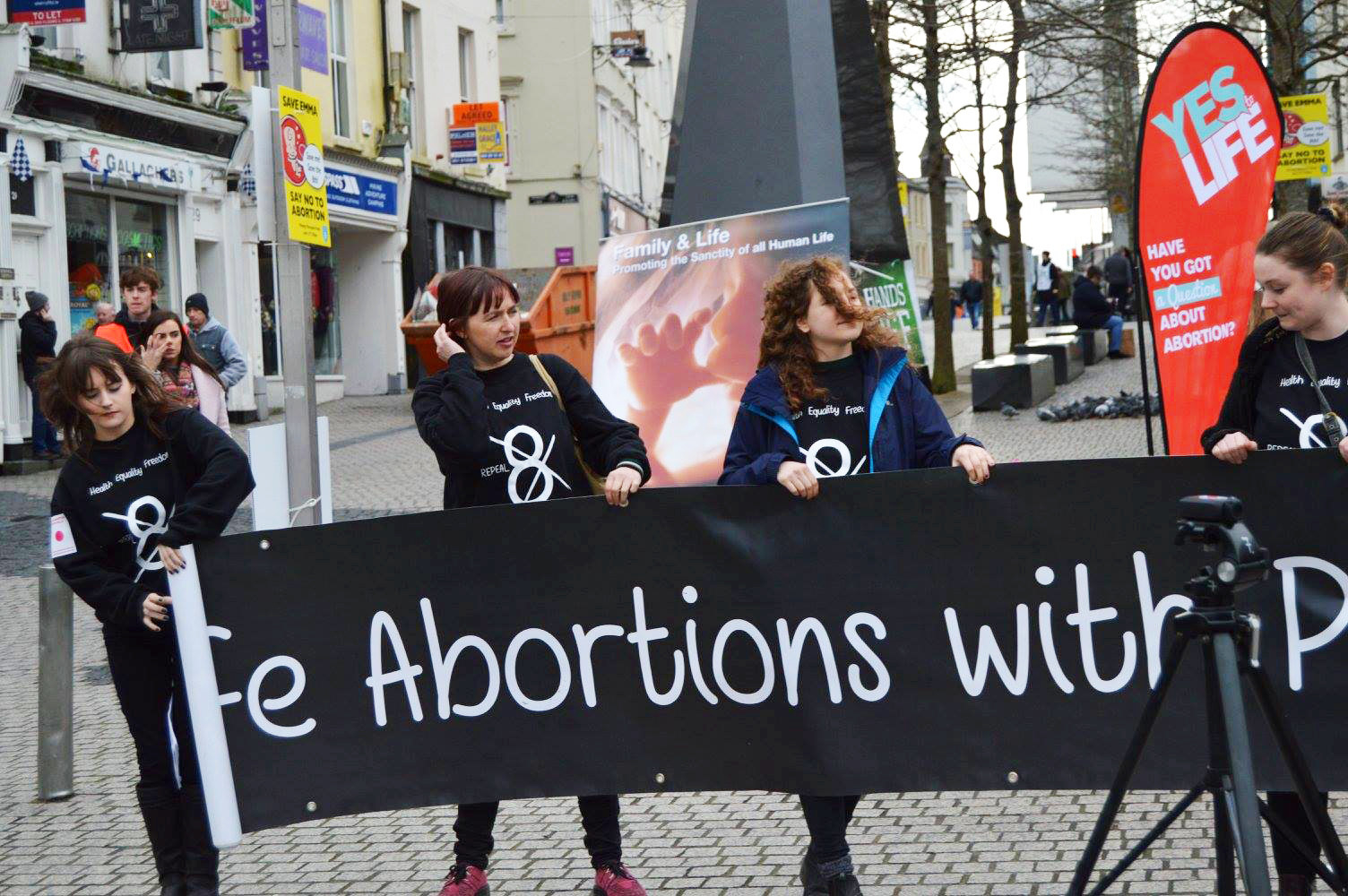
Many have been advocating for a repeal of the eighth amendment since it was introduced through a referendum in 1983, but the death of Savita Halappanavar in 2012 lent the battle a new urgency. Halappanavar asked for an abortion as she had severe back pain and was miscarrying, but was told abortion laws meant doctors were unable to terminate her pregnancy. She had a septic miscarriage, and died days later.
“Everyone in the city felt that,” a young woman listening to speakers at Rosa’s rally in Galway, where Halappanavar died, told us. “It was horrific what happened to that woman.”
“The eighth amendment has to be repealed and women need to be allowed access to abortion,” she continued, huddled under her umbrella during an especially dreary early-evening downpour. “We have to support a woman’s right to have a choice over her own body.”
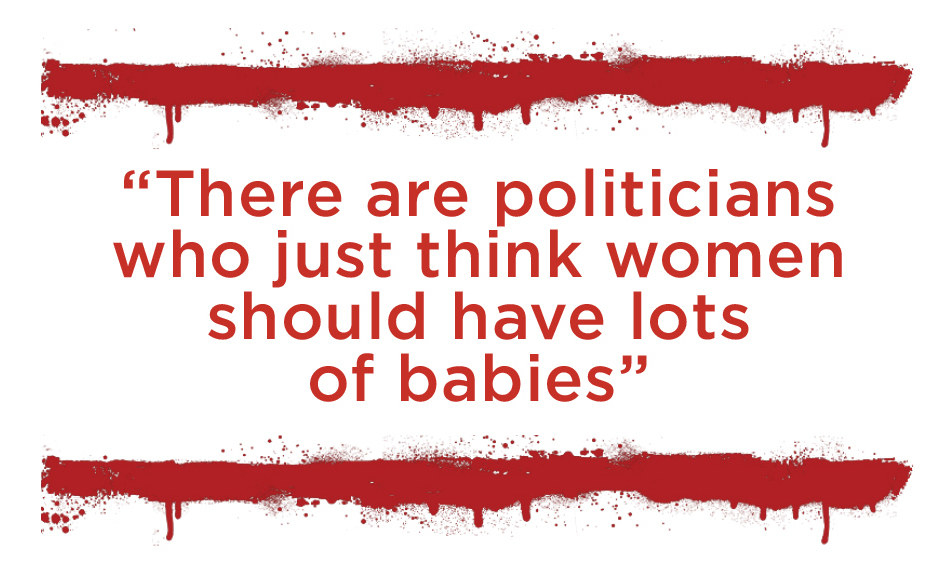
Two other young women in Galway also told us the shadow of Halappanavar's death had played a huge part in shifting opinion on reforming abortion rights in Ireland. “I think the public wants this,” one said.
As the bus set off from University College Dublin on Monday morning, Niahm Plunkett, who is studying biomedical science, told us she had become interested in campaigning for abortion rights as a teenager when she learned what had happened to Halappanavar: “I just remember coming home from school and hearing about it on the news and feeling like, how can this happen?”
In Limerick, a woman rushing to collect her grandchildren from school told us she had campaigned in the 1983 referendum, and worried there was “still quite a big hill to climb” in winning abortion rights now. “There are politicians who just think women should have lots of babies,” she said.
But she remained positive that change could be on the horizon. “I’m delighted to see so many young women out there and involved in this, and quite a few women of my own age who are really supportive too,” she continued. “Older women especially are sympathetic because of what they’ve suffered in Ireland. They don’t want the same for young people.”
But while recent polling by Ipsos Mori for the Irish Times showed that 67% of people would vote for abortion laws to be relaxed in some circumstances, one man we spoke to in Galway worried many might not be so ready for change. “I think a lot of people are just ignorant about what it means not to have access to abortion and have already made up their minds,” he told us.
Education around abortion, both for members of the public and women in crisis, is key to Rosa’s objective. As the bus drove out of Cork on Tuesday, Harrold gave an interview over the phone to a local radio station during which she was confronted by a vehemently anti-abortion rights caller. Later she told us she welcomed the opportunity to debate openly on the subject.
“Radio is so important, people here listen all the time, so we’re very happy to be part of that discussion,” she said. “When we talk to ordinary people about abortion in an understanding way, we come from a place of wanting to keep people safe. Most people in society do not hold the views of the past.”
The radio appearance was also a success for Rosa for another reason. After hearing about the bus, two women from Cork who believed they were pregnant drove to meet it at its next stop in Limerick to seek advice on medical abortion. There, Harrold was able to connect them with Women on Web.
“They are now doing consultations with Women on Web, and if they choose to go ahead and use that method, they should get pills by the end of the week,” Harrold said.
Harrold said she'd spoken to a further 12 women seeking abortion pills during the bus’s three-day journey, either in person or on the phone. On Wednesday a spokesperson for Women on Web told us that they had seen online requests from Ireland increase “significantly” since the bus had set off on Monday.
“This has without a doubt been a successful campaign,” Harrold told us as the bus made its way towards its final stop at Dublin’s central bank. “Independent Women” by Destiny’s Child was blaring from the stereo. It was greeted by hundreds of cheering students, who earlier in the day had completely blocked the city’s central O’Connell bridge during a mass walkout to demand abortion rights.
A sense of urgency filled the streets of the capital as protesters wearing black “repeal” jumpers began to congregate at the Garden of Remembrance for Wednesday night’s major march, the setting sun turning a few lingering rain clouds a vibrant pink.
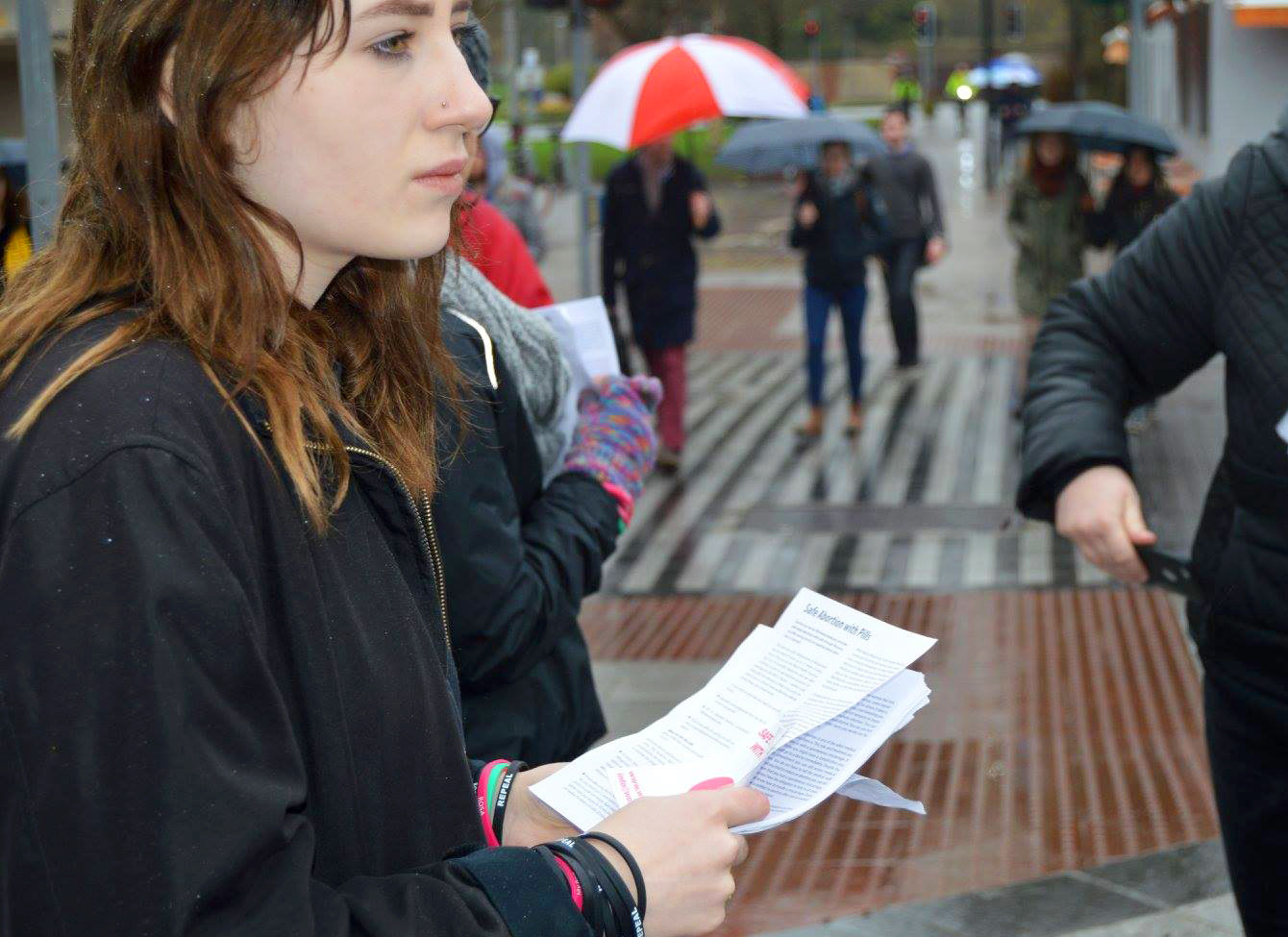
Megan, 19, a student and Rosa activist who traveled on the Bus4Repeal, told us that she felt growing up during such a tumultuous era – the start of which she pinpointed as 9/11 – meant her generation couldn’t help but be politicised. “So much has already been changed in my lifetime,” she told us at a social organised for abortion rights supporters in Cork on Monday night. “We have to stand up and speak out to repeal the eighth too.”
Seventeen-year-old Grace, who wore a “Repeal” sweatshirt with her school uniform at the Dublin march, agreed that young people were key to driving change around abortion. “The eighth amendment was introduced in 1983 so the youngest person who could have voted for it is now 51,” she said. “Nobody of child-bearing age has had a say, so we’re here today to say this is a law that affects us, and we’re not going to take this ban on abortion any more.”
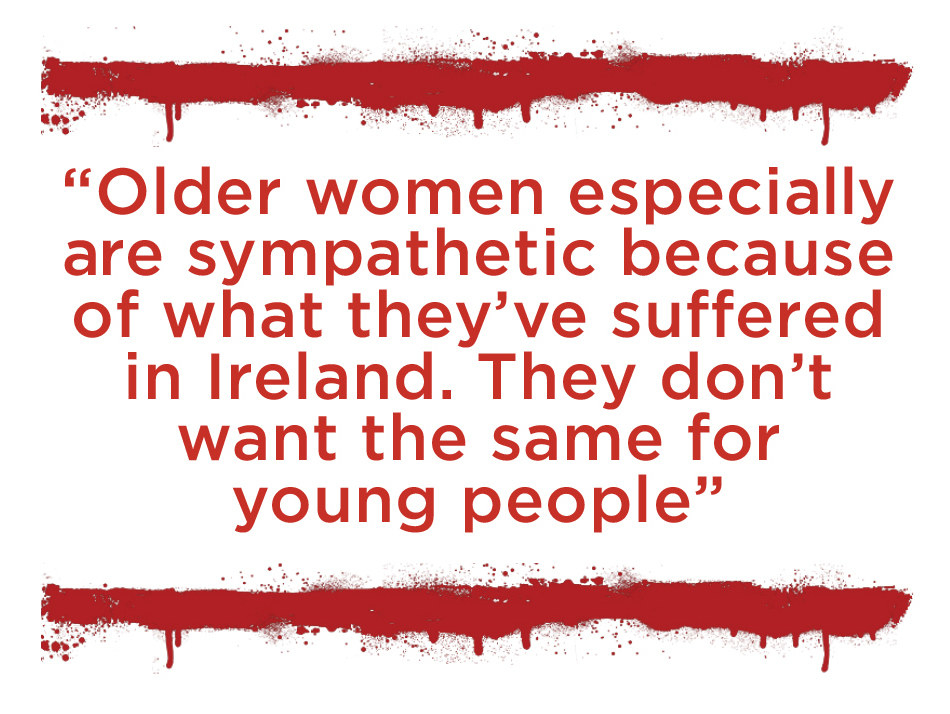
“It’s really important for women to come out in solidarity and show that we have strength in numbers. We need to say we’re not standing for this any more,” Ailbhe O’Connor told us, as she arrived at the protest with a group of friends.
A referendum on repealing the eighth amendment could be imminent, after the Citizens' Assembly – a body set up to consider constitutional questions – holds its final session on the topic in April. Until then, uncertainty remains about the future of abortion in Ireland. Will it ever be fully legalised or only made available in certain circumstances? Will the influence of the Catholic Church loosen enough to make way for the wave of change the younger generation is powering, to override decades of doctrine around women’s reproductive rights?
As Wednesday’s march closed in on Dublin’s official government buildings, the chanting crowd demanded to be heard by prime minister Enda Kenny. There was only one question on thousands of people’s lips: “Enda, Enda, where’s our referenda?”
